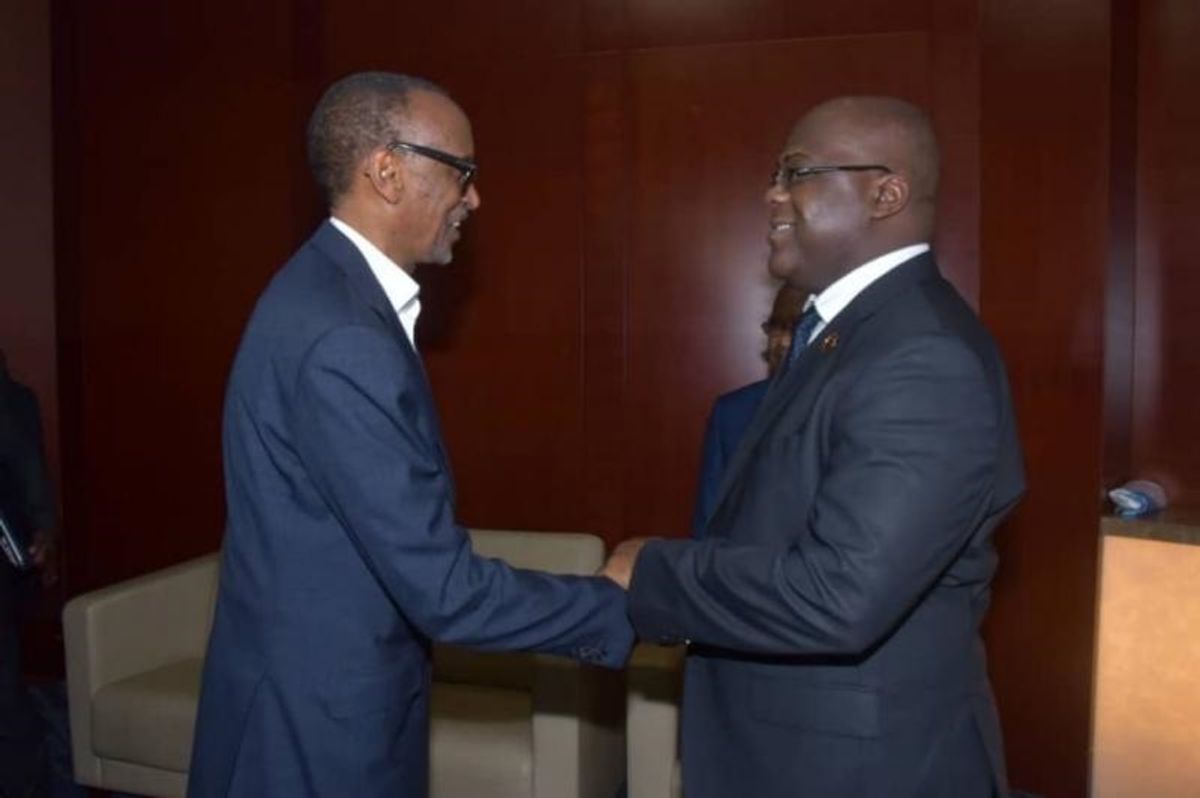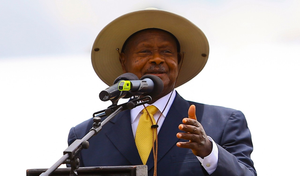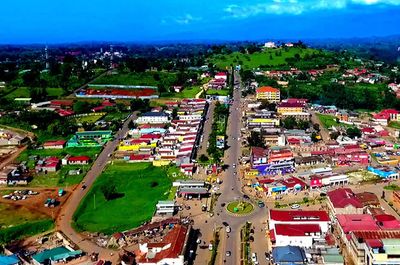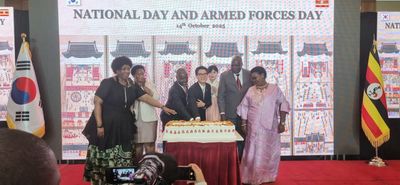

Despite previous efforts to sort out their differences, Presidents Paul Kagame (left) and Felix Tshisekedi, peace continues to elude the mineral-rich DRC
On November 18 last year, the Ugandan military authorities dispatched a squadron of Russian made fighter jets to the skies of the Democratic Republic of Congo (DRC).
The war machines went up in order to rout the Allied Defence Forces (ADF) from their hideouts located within the thick jungles inside DRC.
Nicknamed Shuja, a Swahili term referring to bravery, the operation was prompted by two daring twin bombings executed inside Uganda by members of the ADF terrorist outfit.
The terrorists were reportedly targeting to hit one of the country’s strategic police installations – the Central Police Station – as well as the Parliament Building. Fortunately the National Assembly was saved by the hand of God.
Uganda’s security gurus were quickly mobilised to deliberate about how to deal with ADF who were by now threatening to execute even more devastating terror attacks.
Things moved pretty fast. Gen. Museveni spoke to his DRC peer, Antoine Felix Tshisekedi for clearance to enter the neighboring country to fix the problem posed by ADF once and for all.
Tshisekedi welcomed the UPDF and asked to join the operation looking to rout the insurgents out to displace him from power.
Such was the sophistication of the operation, that the ADF didn’t get any opportunity to detect what was in store for them, until after, the jets were actually busily raining bombs on them.
We have been made to understand from sources familiar with the operation how not even Rwandese President, Gen. Paul Kagame was left in the dark about what Uganda was about to do.
Kagame only got to learn about what was going on after the Ugandan jets were in actual combat.
The fact that he wasn’t informed about the operation, struck Kagame like a thunderbolt out of the blue.
He felt bad. He swayed with the feeling that he had been betrayed by both Museveni and Tshisekedi. He has been in that state ever since to date.
Kagame feels Kigali has legitimate security concerns in DRC just as Museveni.
This is in reference to the Hutu militias Kagame accuses to be hiding and training within the DRC, in readiness to strike Rwanda, at any slightest opportunity.
For that matter, Kagame is of the view that, if the mission of UPDF in DRC is to fight the ADF, then even Kigali shouldn’t have been excluded seeing that there are also rebels in that country plotting against him.
But we understand that Museveni didn’t want Kagame to be allowed to go to DRC this time round.
This is so, since the last time they were allowed to go in together on peace keeping missions, they ended up instead by clashing with each other.
Following a lot of pressure from Kagame’s own strategists, Tshisekedi turned up in Kigali and mocked the military general by merely offering him an handshake!
The hitherto friendly armies of Uganda People’s Defense Forces (UPDF) and Rwandese Patriotic Forces (RPF), clashed twice inside Kisangani in DRC in August, 1999.
This happened merely a month after the signing of the Lusaka ceasefire agreement which required the foreign armies to leave so as to allow then DRC President Joseph Kabila and the rebels to form a compromise government.
Museveni was in favor of an immediate withdrawal. On the other hand, Kagame reportedly wanted to go on fighting in order to overthrow Kabila for ‘arming’ rebels who ‘wanted’ to overthrow him.
Those ideological differences led to the double clashes inside DRC’s Kisangani.
As it was in the past, Kagame has never wished to leave DRC.
He fears that the leadership there is too fragile to deal with the insurgents scheming against the governments neighbouring DRC, more especially in Rwanda.
He thinks Tshisekedi is a very weak leader and that it is desirable that he is helped to first put his house in order.
But other observers of the goings-on submit that the mineral wealth looted in DRC is the biggest motivation behind the rivalries.
Kagame is furthermore perturbed to see Museveni enjoying all the limelight each and every time he gets an opportunity to fight inside DRC.
He is of the view that when such happens, he ends up being overshadowed, yet Museveni keeps getting kudos by fighting insurgents.
As if to add salt to an already septic injury, Tshisekedi’s himself–via his PR handlers–, has been provoking Kagame by openly telling the world that the Rwandan President is scheming against his government through the M23 rebels.
For the record, much as M23 is made up of Kagame’s Tutsi kins and kith, they are actually Congolese as Tshisekedi himself.
This fact would lay squarely the responsibility of accommodating them by Tshisekedi as opposed to repulsing them and terming them as Kagame’s problem.
This is why whilst Tshisekedi keeps stating that Kagame helped them to overrun Bunagana boarder post recently.
They, on the other hand, claim that Tshisekedi’s military attacked them first prompting them to fire back in self-preservation.
M23 say all they want is peace talks with Tshisekedi following which peace will finally prevail.
In fact, these rebels pulled off a PR stunt, when they created a safe passage for the Congolese civilians who had fled to Uganda, to return to DRC to get provisions and such things.
What is intriguing is the fact that much as UPDF pounded and killed hundreds of the ADF rebels, those of M23 managed to run off, moreover, through the jets’ aerial fire!
But now that the East African Community has agreed among themselves as a regional body, to send in a joint army to resolve the long-decades insurgency, that would stop the thinking that DRC is a problem of Kampala and Rwanda.
In the event that the force materializes, it will be a momentous achievement for DRC, which is the latest member of the community, but also her neighbours, who suffer the influx of refugees every time war breaks out in the mineral-rich country.














Henry Lutaaya
Leave a Comment
Your email address will not be published.